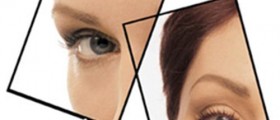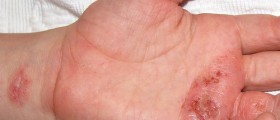
Dermatitis is inflammation of the skin caused by many factors. Eyelid dermatitis affects the eyelids. The conditions leads to swelling of the eyelids and itchiness of the affected area. The skin may be covered with blisters. Skin of the eyelids is delicate and once it is affected by dermatitis the changes develop rapidly and may be of great intensity. The irritation and the process of inflammation in majority of cases develop after the exposure to an allergen.
What Are Causes of Eyelid Dermatitis?
There is a whole variety of factors associated with eyelid dermatitis. For example, a condition most commonly affects women since they use different cosmetic products able to cause an allergic reaction and inflammation of the eyelids. Women who are already allergic to certain allergens are more susceptible to eyelid dermatitis comparing to women with no allergies. Apart from ingredients that may induce an allergic reaction cosmetic products applied on the eyelid area may contain harsh chemicals able to cause irritation and associated symptoms.
Apart from the mentioned eyelid dermatitis may also occur in people who wear contact lenses, especially if they do not handle contact lenses appropriately or do not take proper care of their hygiene.
Allergic reaction, as a potential cause of eyelid dermatitis does not have to be associated only with ingredients of cosmetic products applied on the eyelids. On the contrary, an allergic reaction can also occur due to exposure to other allergens such as pollen, dust and smoke.
Another way to trigger eyelid dermatitis is rubbing the eyes. In case hands are not washed there is a chance of contracting eyelid infection. And finally, eyelid dermatitis may develop as a consequence of bed bug bites.
Treatment Options for Eyelid Dermatitis
The condition does not affect the vision, but in case of severe swelling the person may not be able to see things clearly. It is essential to identify the underlying cause of eyelid dermatitis prior to starting with any treatment.
Patients are advised not to rub the affected eyes no matter how itchy they might be. Rubbing can only make the symptoms worse. Furthermore, once the potential allergen or irritant is identified the person should stay away from the particular substance. For example, if the condition developed due to certain cosmetic products a person should stop using these products. Prescribed medications (usually in a form of ointments or creams) provide with relief from all unpleasant symptoms of inflammation and their ingredients generally depend on the underlying cause of eyelid dermatitis. Once the condition is brought under control recurrence of dermatitis is well prevented by avoiding substances responsible for the initial occurrence of dermatitis.











-Causes,-Symptoms-And-Diagnosis_f_280x120.jpg)





Your thoughts on this
Loading...